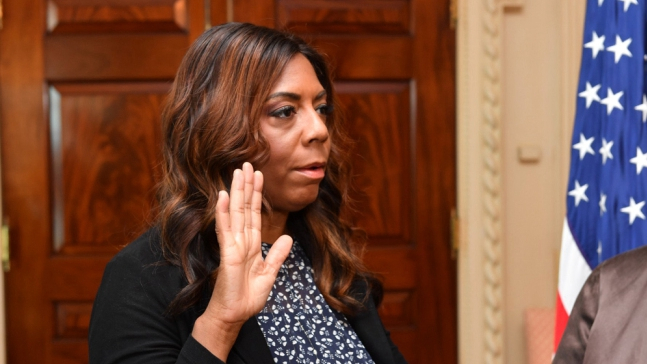
Opinion
22:28, 14-May-2019
Creating conflict in the name of civilization is Cold War thinking

Editor's Note: The following is an edited translation of a commentary that originally appeared on the Chinese-language website, "Commentaries on International Affairs." The translated version was first published on China Plus on May 14, 2019.
Director Kiron Skinner of Policy Planning at the United States Department of State recently courted controversy by claiming that competition between China and the United States was the result of a clash of civilizations, saying it's "a fight with a really different civilization and a different ideology."
Her sensationalist rhetoric is an embarrassment to American political circles and has made the State Department a laughing stock internationally.
Skinner's view is based on the work of the late Harvard political professor Samuel Huntington, who first came up with his theory about a clash of civilizations in an article carried by Foreign Affairs magazine in 1993 after the end of the Cold War.
He further expounded on his theory in his book "The Clash of Civilizations and the Remaking of World Order," which was published in 1996. Huntington tried to analyze the conflicts between civilizations, and warned the West against trying to reshape other civilizations in its own image. He advocated conversation, understanding, and cooperation between civilizations, and the development of a new multipolar and multicultural world order instead of a single, universal culture. Skinner's remarks about Huntington's theory indicate that she has misinterpreted its message.
Skinner said the battle of ideas between China and the United States was a fight the United States hasn't had before.
But is that really true? After the 9/11 terrorist attack, the United States launched two wars in the Middle East and introduced discriminating policies against Muslims.
At the time, there was no talk about a clash of civilizations: at the time, Huntington's theory was considered politically incorrect, because it doesn't regard Western values as universal and would therefore fail to help justify the belief that the United States must be a beacon of civilization for the world.
Even more mind-boggling was Skinner's remark that "It's the first time that we will have a great power competitor that is not Caucasian," which was an attempt to differentiate China-U.S. competition with the confrontation between America and the Soviet Union during the Cold War.
That such racist rhetoric was emerging from the State Department triggered panic among American elites, many of whom were quick to denounce it. But in reality, it epitomizes the Cold War thinking and cultural hegemony that persists in the mindset of some Americans. This mindset is leading some sections of the American polity to draw a dividing line, a new type of Iron Curtain, across the world.
The United States has always boasted about being the most orthodox representative of Western civilization. But its actions show that its idea of civilization is little more than the unrestrained and ruthless competition of the law of the jungle. This mindset informs not only American foreign policy, but has led to extreme divisions within American society itself.
The U.S. State Department is said to be developing a strategy to manage its relations with China that are based on the idea of "a fight with a really different civilization." This kind of backward thinking only hurts the United States and the American people.
The world has no universal civilization. It is home to a mix of vibrant cultures that are result of thousands of years of accumulated history. For thousands of years, Eastern and Western civilizations have benefited tremendously from taking a respectful and tolerant approach towards each other. Those who stir up conflict in the name of civilization are doomed to be cast aside by the judgement of history.
(If you want to contribute and have specific expertise, please contact us at opinions@cgtn.com.)

SITEMAP
Copyright © 2018 CGTN. Beijing ICP prepared NO.16065310-3
Copyright © 2018 CGTN. Beijing ICP prepared NO.16065310-3